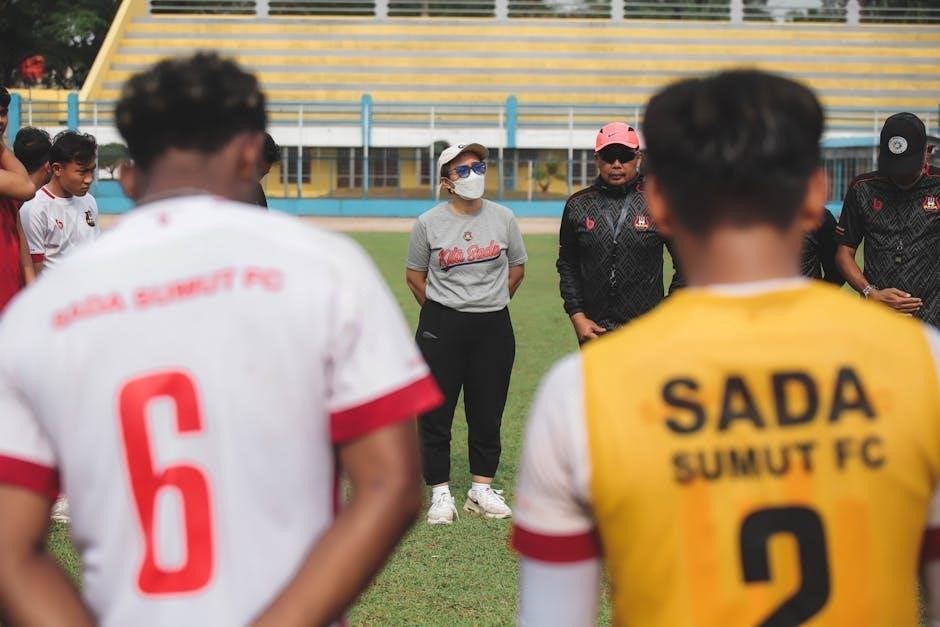Group counseling is a dynamic process where individuals share experiences, fostering personal growth and healing. The 10th edition of Corey’s book offers a comprehensive guide, blending theory and practice, with new features like video segments to enhance learning, emphasizing cultural sensitivity and ethical considerations in modern group settings. This edition provides a framework for understanding and applying group counseling principles effectively, making it an essential resource for both students and professionals.
Overview of the 10th Edition
The 10th edition of Theory and Practice of Group Counseling by Gerald Corey provides an in-depth exploration of ten group counseling theories. It emphasizes the application of these theories in real-world settings, offering a clear and practical framework for effective group counseling. This edition includes updated content on ethical issues, cultural sensitivity, and the latest research in the field. A new video series, “Group Theories in Action,” complements the text, bringing theories to life through real-world examples. Designed for both students and practitioners, the 10th edition helps readers develop their own integrated approach to group counseling, making it a essential resource for modern practice.
Key Features of the 10th Edition
The 10th edition of Theory and Practice of Group Counseling offers several key enhancements. It includes updated content on ethical issues, cultural sensitivity, and the latest research in group counseling. A new video series, “Group Theories in Action,” provides visual demonstrations of each theory in practice. The text also features a clear, straightforward writing style and practical examples to help readers apply theories effectively. Additionally, the 10th edition includes access to MindTap, a digital learning platform with interactive tools, quizzes, and resources to enhance student engagement and understanding. These features make the 10th edition a comprehensive and engaging resource for group counseling education.
Theory and Practice of Group Counseling
The 10th edition of Corey’s book offers a comprehensive exploration of group counseling theories and their practical applications, enhanced with updated research and digital resources.
Overview of Group Counseling Theories
The 10th edition of Corey’s Theory and Practice of Group Counseling provides a detailed exploration of ten prominent group counseling theories. These include psychoanalytic, Adlerian, psychodrama, cognitive-behavioral, humanistic, existential, Gestalt, reality therapy, family systems, and transactional analysis approaches. Each theory is examined in depth, highlighting its core concepts, strengths, and limitations. The book emphasizes the practical application of these theories in real-world settings, offering guidance on how to integrate them into effective group counseling practices. Additionally, the edition features a new video series, Group Theories in Action, which brings each theory to life through visual demonstrations. This resource is invaluable for both students and professionals seeking to understand and apply group counseling theories effectively.
Application of Theories in Practice
The 10th edition of Corey’s Theory and Practice of Group Counseling bridges theoretical knowledge with practical application, guiding readers in translating group counseling theories into real-world scenarios. The book emphasizes developing a personal approach by synthesizing elements from various theories, ensuring flexibility and adaptability in diverse counseling settings. New features, such as expanded content on cultural sensitivity and ethical considerations, enhance the practical relevance of the material. Additionally, the inclusion of video resources, like Group Theories in Action, provides visual demonstrations of how theories can be effectively applied in practice. This approach equips counselors with the tools to address client needs dynamically and ethically, aligning with contemporary trends in the field.
Developing a Personal Approach to Group Counseling
The 10th edition of Corey’s Theory and Practice of Group Counseling encourages counselors to develop a unique, personal approach by synthesizing elements from various theories. This edition emphasizes the importance of cultural sensitivity, ethical considerations, and adaptability in group settings. By integrating personal values and styles, counselors can create a tailored framework that resonates with diverse client needs. The book provides practical guidance and real-world examples to help professionals refine their techniques and build confidence in their practice. This approach fosters a dynamic and inclusive environment, ensuring effective group counseling outcomes.

Group Counseling Leadership
Effective group counseling leadership involves guiding members toward shared goals, fostering engagement, and maintaining a supportive environment. The 10th edition explores various leadership styles and strategies to enhance group dynamics and address challenges, ensuring productive outcomes.
Roles and Responsibilities of a Group Leader
A group leader plays a pivotal role in fostering a supportive environment, facilitating meaningful interactions, and guiding the group through its developmental stages. They are responsible for creating trust, encouraging participation, and ensuring ethical practices. Leaders must remain attuned to group dynamics, addressing conflicts and promoting cohesion. They also serve as role models, demonstrating active listening and empathy. Additionally, leaders are tasked with setting clear boundaries, maintaining focus, and helping members achieve their goals. The 10th edition emphasizes the importance of cultural sensitivity and adaptability in leadership. Effective leaders balance directive and nondirective approaches, fostering a collaborative atmosphere that encourages personal growth and collective progress.
Leadership Styles in Group Counseling
Effective group leaders employ various styles tailored to the group’s needs. Directive leaders provide clear guidance and structure, while nondirective leaders encourage self-discovery through minimal intervention. Collaborative leaders work alongside members, fostering a shared responsibility for growth. The 10th edition highlights the importance of adapting leadership styles to group dynamics and cultural contexts. Leaders must balance authority with empathy, ensuring a supportive environment. Flexibility in leadership styles enhances engagement and trust among members. Corey’s book emphasizes that no single style is universally effective, underscoring the need for leaders to remain adaptable and attuned to the unique demands of each group.
Challenges in Group Leadership
Group leaders face numerous challenges, including managing diverse personalities and maintaining engagement. Conflict resolution and ensuring equal participation are common issues. Leaders must also navigate ethical dilemmas and cultural sensitivity. The 10th edition emphasizes the importance of adaptability and emotional intelligence in addressing these challenges. Effective leaders balance authority with empathy, fostering a supportive environment. Additionally, managing group dynamics while maintaining focus on therapeutic goals can be complex. Corey’s book provides practical strategies and case examples to help leaders overcome these obstacles, ensuring effective and ethical group counseling practices.

Stages of Group Development
Group development progresses through stages, including formation, initial engagement, transition, working, and termination. Each stage presents unique challenges and opportunities for growth, as detailed in Corey’s text.
Initial Stage of Group Formation
The initial stage of group formation is characterized by members’ first encounters, marked by curiosity and apprehension. Individuals often feel uncertain about their roles and the group’s purpose. Trust begins to develop as members share initial thoughts and experiences, guided by the leader’s facilitation. The atmosphere is tentative, with participants testing boundaries and exploring expectations. The group leader plays a crucial role in setting the tone, establishing norms, and fostering a sense of safety. This foundational stage lays the groundwork for future interactions, emphasizing the importance of clear communication and mutual respect to create a cohesive and productive group environment.
Transition Stage in Group Development
The transition stage marks a shift from initial orientation to deeper exploration of group dynamics. Members begin to challenge assumptions, express differing opinions, and establish roles within the group. This phase is characterized by heightened emotions, potential conflicts, and a redefinition of expectations. The group leader must navigate these challenges, fostering open communication and encouraging members to take responsibility for their contributions; This stage is critical as it lays the groundwork for meaningful collaboration, trust, and shared purpose. Effective leadership during this transition ensures that the group moves beyond superficial interactions, preparing members for the productive working stage that follows.
Working Stage of Group Counseling
The working stage is where group counseling reaches its peak productivity. Members engage in meaningful interactions, exploring issues deeply and applying therapeutic techniques to achieve personal growth. The focus shifts from establishing trust to actively addressing challenges and implementing change strategies. Group leaders facilitate this process by helping members connect insights to real-life situations, fostering accountability, and encouraging constructive feedback. This stage is characterized by high levels of collaboration, problem-solving, and emotional engagement. The leader’s role evolves to guiding rather than directing, ensuring that each member progresses toward their goals. The effectiveness of this stage is crucial for the group’s success and individual outcomes.
Termination Stage in Group Counseling
The termination stage marks the final phase of group counseling, focusing on closure and preparation for life beyond the group. Members reflect on their progress, consolidate insights, and plan for future challenges. The leader helps participants process emotions related to endings, such as sadness or gratitude, and reinforces the skills and strategies learned. This stage also involves evaluating the group’s effectiveness and providing support for continued growth. Leaders ensure that members feel empowered to apply what they’ve learned independently. The termination stage is crucial for providing closure and reinforcing the group’s accomplishments, ensuring a smooth transition for participants moving forward.

Group Counseling Theories
Group counseling theories provide diverse frameworks for understanding and addressing human behavior. The 10th edition explores ten theories, offering insights and practical applications for effective group work.
Psychoanalytic Approach to Group Counseling
The psychoanalytic approach to group counseling focuses on exploring unconscious thoughts and past experiences to understand behavior. In the 10th edition, Corey emphasizes this theory’s role in group dynamics, highlighting how members’ interactions can reveal unconscious conflicts. The approach encourages leaders to facilitate deep emotional exploration, helping individuals gain insight into repressed feelings. New to this edition is an increased emphasis on how psychoanalytic principles can be applied in modern group settings, making it a valuable framework for addressing complex emotional issues. The text also includes video resources that bring this theory to life, enhancing understanding and practical application.
Adlerian Group Counseling
Adlerian group counseling emphasizes social interest, goal-setting, and personal responsibility. This approach focuses on helping individuals understand their role within a larger community, fostering cooperation and encouragement among group members. The 10th edition highlights how Adlerian principles promote a positive, supportive environment, encouraging members to explore their goals and develop strategies for change. Leaders in Adlerian groups act as facilitators, guiding discussions to help individuals identify and work toward their life goals. The text also explores how this approach integrates with other theories, offering a holistic framework for addressing diverse client needs. New video resources in this edition provide practical examples of Adlerian techniques in action.
Psychodrama in Group Counseling
Psychodrama in group counseling is an action-oriented approach that uses role-playing and spontaneity to explore emotions, conflicts, and interpersonal dynamics. This method, rooted in J.L. Moreno’s work, encourages individuals to reenact life scenarios, fostering self-awareness and catharsis. The 10th edition highlights how psychodrama promotes creativity and engagement, allowing group members to express feelings and gain insights in a dynamic, experiential way. Leaders facilitate the process, guiding participants through structured exercises like role reversal and future projection. This approach is particularly effective for addressing unresolved issues and enhancing interpersonal skills. New video resources in this edition illustrate psychodrama techniques in practice, offering practical examples for implementation.
Cognitive-Behavioral Group Counseling
Cognitive-behavioral group counseling focuses on identifying and modifying negative thought patterns and maladaptive behaviors. This approach emphasizes the interplay between thoughts, feelings, and actions, helping individuals recognize and challenge unhelpful cognitive distortions. The 10th edition highlights practical techniques such as cognitive restructuring, behavioral activation, and skills training, which are applied in group settings to promote personal change. Leaders facilitate structured sessions, encouraging active participation and problem-solving. This evidence-based method is particularly effective for addressing issues like anxiety, depression, and anger management. The book also provides case examples and exercises to illustrate how to integrate cognitive-behavioral principles into group work, enhancing both individual and collective growth.
Humanistic Approach to Group Counseling
The humanistic approach to group counseling emphasizes personal growth, self-actualization, and empathy. It focuses on creating a supportive environment where individuals feel valued and understood. This approach, influenced by Carl Rogers, highlights the importance of genuineness, unconditional positive regard, and empathetic understanding. In group settings, leaders foster a non-judgmental space, encouraging members to explore their feelings and potentials. The 10th edition of Corey’s book explores how humanistic principles can be integrated into group practice, promoting self-awareness and personal empowerment. By emphasizing the therapeutic relationship, this approach helps individuals and groups achieve deeper self-insight and meaningful change, aligning with the book’s focus on practical applications of counseling theories.
Existential Group Counseling
Existential group counseling focuses on exploring individuals’ unique experiences, freedom, and responsibility. It emphasizes the here-and-now, helping members confront existential concerns like meaning, purpose, and mortality. Leaders encourage authenticity and self-reflection, fostering a deeper understanding of life’s complexities. The 10th edition highlights how existential principles can be applied in group settings, promoting personal responsibility and awareness. By addressing existential themes, this approach empowers individuals to find their own meaning and live authentically, aligning with the book’s emphasis on integrating theory into practice. This approach is particularly effective in groups grappling with existential crises or seeking a deeper sense of purpose and direction in life.
Gestalt Group Counseling
Gestalt group counseling focuses on enhancing awareness of the present moment, emphasizing personal responsibility and immediate experiences. It encourages individuals to explore their thoughts, feelings, and behaviors in the here-and-now, fostering self-awareness and integration of fragmented parts of the self. Techniques like the empty chair exercise help clients confront internal conflicts and unfinished business. The group leader acts as a facilitator, guiding members to engage fully with their experiences. This approach promotes holistic understanding, helping individuals move toward greater self-awareness and integration. The 10th edition discusses how Gestalt principles can be applied in group settings, emphasizing the importance of direct experience and authenticity in the therapeutic process.
Reality Therapy in Group Counseling
Reality therapy, developed by William Glasser, focuses on helping individuals take responsibility for their choices and behaviors. In group settings, it emphasizes the present and future, encouraging members to identify and achieve realistic goals. The therapist acts as a guide, helping participants evaluate their actions and develop plans for positive change. Group members are encouraged to focus on what they can control, fostering a sense of empowerment. Techniques such as role-playing and problem-solving exercises are often used to promote self-awareness and accountability. Reality therapy in groups aims to help individuals recognize their ability to make constructive choices, leading to more effective and fulfilling behaviors.
Family Systems Theory in Group Counseling
Family systems theory views individuals as part of a larger relational network, emphasizing the interconnectedness of family members. In group counseling, this approach helps participants understand how their family dynamics influence their thoughts, feelings, and behaviors. The therapist facilitates exploration of roles, communication patterns, and unresolved conflicts within the family system. Group members learn to identify and challenge dysfunctional patterns, fostering healthier interactions. Techniques such as genograms and role-playing are often used to explore family influences. The goal is to promote personal growth and systemic change, enabling individuals to develop more adaptive ways of relating within and outside the group setting.
Transactional Analysis in Group Counseling
Transactional Analysis (TA) is a theory developed by Eric Berne, focusing on interpersonal interactions and ego states—Parent, Adult, and Child. In group counseling, TA helps members identify and understand their communication patterns and behaviors. The therapist encourages participants to recognize how past experiences influence present interactions, fostering self-awareness and personal growth. Techniques like analyzing transactions and identifying games or scripts are used to address problematic patterns. Group members learn to adopt healthier ways of relating, promoting emotional healing and improved relationships. This approach emphasizes empowerment and accountability, enabling individuals to take charge of their behaviors and responses within the group setting.

Special Topics in Group Counseling
Exploring special topics like ethics, cultural sensitivity, and technology in group counseling. The 10th edition addresses these areas, providing insights into modern challenges and innovative solutions.
Ethical and Professional Issues in Group Counseling
Ethical and professional issues are critical in group counseling, ensuring confidentiality, informed consent, and clear boundaries. The 10th edition emphasizes accreditation standards and ethical dilemmas, providing practical guidance for counselors. New content addresses cultural sensitivity, highlighting the importance of respecting diverse backgrounds. Additionally, the book explores the impact of technology on ethical practices, such as online group counseling. Video segments illustrate ethical challenges, helping counselors navigate complex situations. These resources equip professionals with the tools to maintain integrity and adapt to evolving standards in group counseling practice, fostering a safe and inclusive environment for all participants.
Cultural Sensitivity in Group Counseling
Cultural sensitivity is essential in group counseling, ensuring that diverse backgrounds and identities are respected. The 10th edition emphasizes the importance of cultural awareness, providing strategies to address power dynamics and promote inclusivity. New content highlights the need for counselors to recognize and navigate cultural differences, fostering an environment where all participants feel valued. The book also explores the impact of cultural identity on group dynamics, offering practical approaches to create a safe space for open dialogue. Supplementary resources, such as video segments, demonstrate how cultural sensitivity can be effectively integrated into group counseling practice, enhancing the ability to connect with diverse clients.
Technology and Online Group Counseling
Technology has revolutionized group counseling, enabling online sessions through video conferencing platforms. The 10th edition highlights the integration of digital tools, such as MindTap, to enhance learning and practice. Online group counseling offers flexibility, reaching diverse populations and ensuring accessibility. The book discusses ethical considerations, like confidentiality and privacy, in virtual settings. It also explores how digital platforms can facilitate engagement and connection among participants. Supplementary resources, including video segments, demonstrate effective strategies for conducting online groups. This edition emphasizes adapting traditional group counseling techniques to digital environments, ensuring practitioners remain competent in a rapidly evolving field. Technology is reshaping group counseling, making it more accessible and inclusive than ever before.

Resources for Group Counseling
Access the 10th edition PDF for comprehensive insights into group counseling theories and practices. Supplementary materials, including the Student Manual and MindTap, enhance learning. Free resources and digital libraries offer additional support for education and practice.
Accessing the 10th Edition PDF
The 10th edition of Theory and Practice of Group Counseling is widely available in digital formats. Students and professionals can access the PDF through platforms like etextnow.com or academia.edu. Many universities offer free access through their libraries, while others require purchase. The book can also be downloaded via MindTap or Cengage Learning. For those seeking free resources, older editions or excerpts may be available on academic websites. Always ensure compliance with copyright laws when accessing or sharing the material. The ISBN for reference is 0357622952, aiding in locating the correct edition. This resource is invaluable for understanding group counseling dynamics and practices.
Free Resources for Group Counseling Education
Free resources for group counseling education are available through various platforms. Websites like Academia.edu and ResearchGate offer access to research papers, theses, and book excerpts. Open-access journals and repositories provide valuable insights into group counseling theories and practices. Additionally, many universities and educational institutions offer free PDF downloads of selected chapters or older editions of textbooks through their libraries. While the 10th edition of Corey’s book is copyrighted, older editions or supplementary materials may be available for free. Always ensure compliance with copyright laws when accessing or sharing such materials. These resources are invaluable for students and professionals seeking to enhance their knowledge in group counseling.
Supplementary Materials for Group Counseling
Supplementary materials for group counseling include a range of tools designed to enhance learning and practice. The 10th edition of Corey’s book is accompanied by a Student Manual and MindTap, a digital platform offering interactive exercises, quizzes, and video segments. Additionally, a video series titled Group Theories in Action brings theories to life, providing practical insights. Other resources include workbooks, leader guides, and online modules that complement the textbook. These materials are available through the publisher’s website or authorized retailers. They are designed to help students and professionals apply theoretical concepts in real-world settings, fostering a deeper understanding of group counseling dynamics and leadership strategies.
The 10th edition of Corey’s Theory and Practice of Group Counseling provides a comprehensive exploration of group counseling, blending theory with practical application. It equips professionals with essential tools to navigate the complexities of group dynamics, emphasizing cultural sensitivity and ethical practice. The integration of new video resources and updated content ensures a modern approach to group counseling, making it a valuable resource for both education and professional development in the field.
Final Thoughts on Group Counseling
Corey’s Theory and Practice of Group Counseling, 10th Edition, offers a comprehensive exploration of group counseling, blending theory with practical application. The book emphasizes cultural sensitivity, ethical considerations, and the integration of various therapeutic approaches. By providing a clear framework for understanding group dynamics, it enables counselors to develop effective strategies for diverse settings. The inclusion of video resources and updated content ensures a modern, engaging learning experience. This edition serves as a valuable resource for both students and professionals, fostering growth and reinforcing the importance of group counseling in addressing mental health needs.
Future Directions in Group Counseling Practice
The future of group counseling practice lies in integrating technology, cultural sensitivity, and evidence-based theories. With the rise of online platforms, virtual group sessions are becoming increasingly popular, offering accessibility and convenience. Corey’s 10th Edition emphasizes the importance of adapting to diverse client needs, highlighting the need for counselors to stay updated on ethical standards and digital tools. The integration of video resources and modern learning platforms, like MindTap, underscores the evolving nature of education in this field. By focusing on inclusivity and innovative approaches, group counseling can continue to empower individuals and communities effectively in a rapidly changing world.




About the author